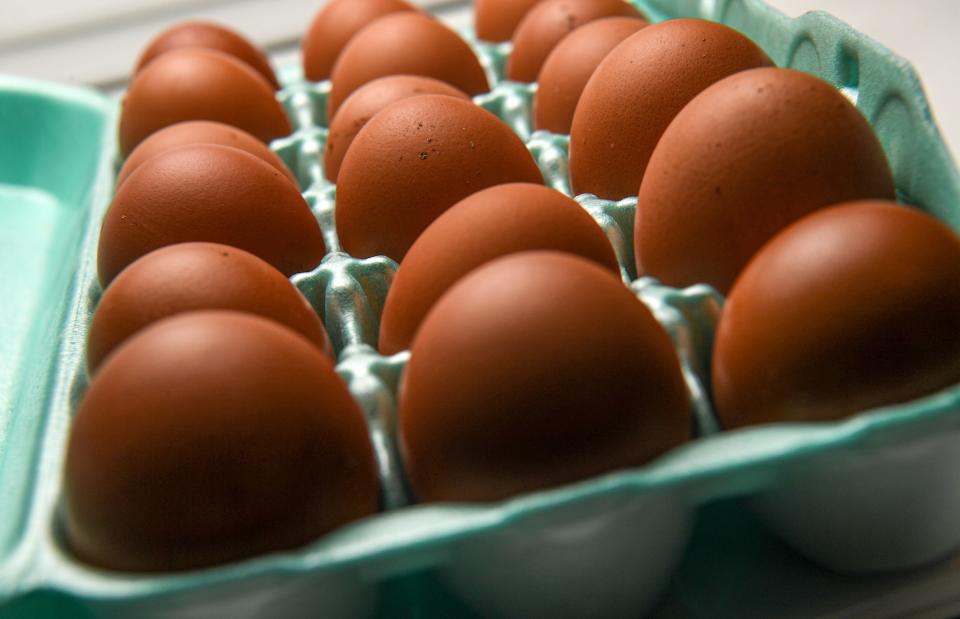Bird flu in Michigan: How bad is it? What does it mean for eggs, milk?
LANSING — The avian flu outbreak across the U.S. has continued to spread in Michigan, where the disease has been found in poultry and cattle, and prompted an emergency order by state officials earlier this month.
The news Wednesday that a Michigan farm worker is just the second person in the U.S. diagnosed with avian influenza, transmitted from cattle, is the latest indication of what could be a widespread impact on Michigan. Ripple effects could be felt in egg and meat prices and availability, as well as 4-H fairs.
On May 16, new surfaced of an outbreak at Herbruck’s Poultry Ranch Ionia County, and the company announced 400 layoffs and that 6.5 million poultry likely will be killed to stop the spread in Ionia County alone.
Nearly 91 million poultry in the U.S. are affected, with outbreaks in 48 states as of Friday, according to the Centers for Disease Control. Additionally, nine states, including Michigan, have reported outbreaks of the avian flu in cattle, with 49 herds across the U.S. impacted. There also have been more than 9,000 cases detected in wild birds in 50 states.
The most recent outbreaks have been in backyard flocks: in Gratiot County on May 2 and in Ionia County on May 10, said Tim Boring, director of the Michigan Department of Agriculture and Rural Development.
Boring noted the issue is not new to Michigan, as poultry has been impacted several times in recent years.
"What makes it different here today is the detection of highly pathogenic avian influenza in dairy cattle," Boring said. "Poultry operations have been operating at a high level of virus security for years."
Here's what we know about the disease and its potential impact.
Is H5NI (avian flu) dangerous to people?

There have now been three cases detected in humans in the U.S., although the World Health Organization said between 2023 and this year 889 people have been infected in 23 countries. In the U.S., a poultry worker was infected in 2022 and this year, a person was exposed from a dairy cow in Texas. And Thursday, a person working on a dairy farm was infected. The worker, a man, developed conjunctivitis, commonly known as pinkeye, and has fully recovered, Dr. Natasha Bagdasarian, the state's chief medical officer, told the Detroit Free Press. The state did not disclose what county the man worked in.
The disease can be deadly for humans, as more than half of the human cases worldwide have been fatal, Erin Sorrell, senior scholar at the Johns Hopkins Center for Health Security and associate professor at Johns Hopkins Bloomberg School of Public Health in Maryland told the Association of American Medical Colleges. However, that hasn't been the case in the U.S.
The person infected after working with poultry in 2022 reported mild fatigue and recovered, the AAMC reported, and the case this year in Texas caused conjunctivitis, and the person recovered.
“As of now, this is a low-risk situation for humans,” Michael Osterholm, director of the Center for Infectious Disease Research and Policy at the University of Minnesota, told the AAMC. But that could change as the virus spreads among more animals, he warned.
Boring said people aren't getting sick from the avian flu in Michigan.
"We continue to be on high alert that this virus doesn’t mutate," he said. "We continue to see it remain a low public health threat. We’re focused on the animal response so we don’t see future health threats.”
The CDC also said the public health risk at this time is low, but the agency is “watching the situation carefully and working with states to monitor people with animal exposures.”
Which counties in Michigan are affected by poultry infections?

Michigan has seen large number of backyard outbreaks, and a few commercial infections, Boring said.
There are infections at commercial poultry operations in Ionia, Gratiot, Newago and Ottawa counties, Boring said. Barry County has had a backyard flock infected.
What is the impact on poultry?
The avian flu is devastating to chicken flocks, according to the CDC, with 90% to 100% mortality within 48 hours for infected chickens.
The virus, most often carried by wild birds, is highly contagious, and birds spread the disease in their saliva, nasal secretions and feces. They also can become infected through contact with surfaces that are contaminated with the virus, the CDC said.
Once an infection is detected in a flock, the entire flock is killed, or depopulated, per federal regulations, according to the National Chicken Council.
Boring said because the disease is both highly contagious and lethal in avian species of all kinds, state and federal officials work with a producer to discuss options once a case is confirmed. The result, Boring said, is typically the "depopulation of flocks because the disease is so lethal."
Boring said MDARD is optimistic that "we don’t see further impacts from this on avian species or commercial flocks.”
Greenstone Farm Credit Services, which produces financial outlooks for agricultural markets, said more than 52 million poultry have died in 46 states, although Michigan has been impacted much less severely.
Which counties in Michigan are affected by cattle infections?
Ingham, Clinton and Gratiot counties in the Lansing area, as well as Allegan and Isabella counties have reported infections in dairy herds, according to MDARD. The first infection was detected on March 29.
Among the measures Boring has directed in an emergency order are to isolate infected cattle, prohibit non-essential visitors and anyone who has recently been on a poultry farm. The department notes that spread of infections among herds is not fully understood by scientists.
Thus far, "this has been a disease detected in lactating dairy cattle," Boring said. "We haven’t seen it in beef cattle."
What is Michigan doing?
Boring on May 1 issued an emergency order because of the spread of infections in cattle and poultry.
The order puts into place, as of May 8, requirements that farms designate a biosecurity manager, create a secure perimeter to the farm with limited access points, and establish cleaning and disinfection practices and procedures at those access points for both vehicles and individuals. Farms must also keep a log book recording all vehicles and people who have gotten out of vehicles and crossed those access points, which must be available to be reviewed by MDARD officials at their request.
Additionally, Boring instituted a ban on exhibiting all lactating cattle, and those in the last two months of pregnancy, until there are no new cases of avian flu in Michigan for 60 days. An exhibition ban is in place for all species of poultry until there are no new cases in the state for 30 days. That ban includes chickens, guinea fowl, turkeys, waterfowl, pigeons, doves, peafowl, and game birds that are raised on farms.
Egg and milk production in Michigan are among the largest in the country.
Michigan has nearly 900 dairy farm families who care for about 440,000 cows, and ranks first in the country in milk production per cow.
Are chicken and turkey safe to eat?
Avian flu is not a foodborne illness, according to the National Egg Council, meaning people can't get it from eating properly cooked poultry. And federal and state rules prevent infected birds from getting in the food chain.
Boring described the action of state and federal agencies as a "really robust response" and added that the USDA, FDA and CDC "have had a coordinated federal response” to the outbreak.
People are urged to follow proper food handling and cooking when preparing raw chicken. While poultry is deemed safe at 165 degrees, best quality is determined to be 170 degrees for white meat for chicken and turkey, 180 degrees for dark meat for chicken and turkey, and 165 degrees for ground chicken and turkey.
Will this affect egg prices or availability?

Egg prices are higher and inching up in the U.S., although they are not expected to return to 2021 levels, the Associated Press reported.
The average price of a dozen eggs was $2.99 in February, down from $4.21 last year, according to government data, AP said, but higher than the $1.59 per dozen in February 2021.
The avian flu is expected to impact prices, Emily Metz, president of the American Egg Board, a marketing organization, told the AP. She explained that even after an outbreak is over, egg markets can take time to recover, as it takes three to six months to restock a flock. With a lower egg supply, prices are expected to rise.
And, Metz told the AP, if farms restock with too many chickens, it can cause prices to drop, which happened last summer as prices approached $2 a dozen
Additionally, Michigan is one of several states implementing cage-free facilities, which will add costs to producers as they transition. Michigan’s rule takes effect this year, AP reported.
Regarding egg prices, Boring said, "We’re still working to determine impact of that. We're working closely with affected producers to help them work through these incidents and get them back into production as quickly as possible."
Egg prices are expected to decrease about 2.8% this year, according to the U.S. Department of Agriculture, AP reported, although the growing threat of avian flu could ultimately impact that estimate.
What about milk?
Pasteurization has been confirmed to kill the virus, Boring said.
What does this mean for 4-H fairs?
"Unfortunately, this is not the first time around for highly contagious avian flu," in Michigan, Boring said. "We have to be free from backyard or commercial detections for 30 days for poultry, and we work closely with fairs and associations to communicate that."
He added that because the disease is only affecting lactating dairy cattle, "There’s still certainly the opportunity to have other species of cattle at fairs."
What's next?
"This is a public health issue for us, and an animal health issue," Boring said. "We’re learning a lot very quickly, and standing up safeguards for farms.
"We’re not out of the woods in any case. We continue to see new cases on dairy farms and that impacts poultry operations. We’re very much in an active response in both poultry and dairy in Michigan."
This article originally appeared on Lansing State Journal: How bad is the bird flu in Michigan and what does it mean for eggs, milk?

